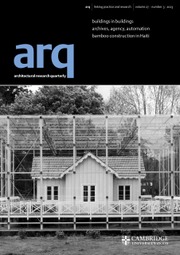Article contents
Sci-fi Eco-Architecture: science fiction, sustainability and design studio
Published online by Cambridge University Press: 09 July 2013
Extract
In the summer of 2009, while on vacation in Italy, I lay on a deck chair on a beach under the scorching sun reading Ecology of Fear: Los Angeles and the Imagination of Disaster. I had taken Mike Davis's book as holiday reading after becoming interested in attitudes to sustainability as represented in films through supervising the unpublished dissertation ‘The Science and Fiction of Sustainable Living’. The dissertation analysed approaches to the green movement of the 1970s versus those held today. It did this through the study of ecological science fiction movies made during the two periods. As someone grounded in humanities research, using film studies research methods rather than conventional building science methods seemed to me an engaging, original approach to sustainability. The dissertation compared the 1972 American environmental science fiction film Silent Running to the 2007 British science fiction film Sunshine. During this supervision, the student gave me a copy of the films. Because Silent Running resonated with me, I took it on that same Italian holiday and watched it again. I recall thinking that Silent Running offered a departure point for an alternative kind of sustainable design studio. Then and there, I selected a film clip that I screened – in the background and without volume – at studio presentations to students held in September 2009.
- Type
- education
- Information
- Copyright
- Copyright © Cambridge University Press 2012
- 1
- Cited by




